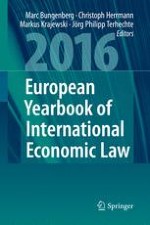
2016 | OriginalPaper | Chapter
Critical Theory and Practice in International Economic Law and the New Global Governance
Author : Sol Picciotto
Published in: European Yearbook of International Economic Law 2016
Publisher: Springer International Publishing
Activate our intelligent search to find suitable subject content or patents.
Select sections of text to find matching patents with Artificial Intelligence. powered by
Select sections of text to find additional relevant content using AI-assisted search. powered by